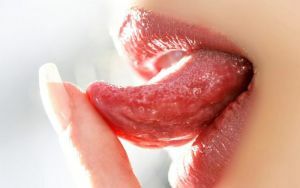 Glossology( glossodinia) is a neurostomatological pathology that manifests itself in a healthy person in the form of pain and paresthesia in the language, with no obvious changes. Discomfort can spread to the entire oral cavity.
Glossology( glossodinia) is a neurostomatological pathology that manifests itself in a healthy person in the form of pain and paresthesia in the language, with no obvious changes. Discomfort can spread to the entire oral cavity.
The disease is a consequence of other illnesses or injuries, often caused by a disturbance of the emotional background, which is why glossalgia develops predominantly in women over forty, rarely in men.
What causes the disease?
Glossalgia is considered one of the functional disorders, as there are no specific reasons for its occurrence.
The causes of the disease are diverse, these are traumas of the tongue and the surrounding cavity by foreign objects, chipped edges of teeth and illiterate seals. There is a glossodynia at the same time as a malfunction in the work of the nervous system, after stress, a nervous breakdown, and then can go on into a chronic character, being maintained at the level of reflexes. 
Also, the disease occurs with problems of the nervous system, manifested by a decrease in receptor sensitivity or a change in taste.
Often it develops in parallel with the disease of the digestive system and liver. In patients suffering from suspiciousness, the emergence of glossodynia is facilitated by vascular lesions associated with impaired activity of endocrine glands and the nervous system.
The occurrence of significant complications in the work of the central nervous system rarely causes the development of the disease. Although sometimes the symptoms of glossalgia can develop with neurosyphilis, encephalitis and impairment of cerebral circulation.
Features of the clinical picture
Glossalgia is expressed by the appearance of a burning sensation in the patient, tingling and sagging the surface of the tongue, the symptoms are generally similar to the impressions when eating spicy food. They can be periodic or permanent. There is also a feeling of dryness in the mouth, the patient quickly becomes tired during a conversation.
In a situation of agitation or overwork, the symptoms increase, and in a relaxed state decrease, especially during eating.
Sensations of burning and tingling are stronger in the tip of the tongue and on the sides, the back and root are rarely captured. Feelings are changeable, not showing the presence of a specific place of injury, and the area where the pain symptoms are manifested, can move.
In this case, the signs of the disease can disappear on their own without treatment forever, or appear on another site.
There are no lesions in the surface of the oral mucosa or tongue, in rare cases there is a small puffiness or plaque in the tongue, formed due to constant drying in the mouth, hypertrophy of some papillae develops. The sensitivity to pain on the affected areas is reduced.
 Symptoms manifested in the oral cavity are often accompanied by signs of a depressed state or excessive excitability of patients, the appearance of anxiety or suspiciousness. Patients begin to delve into the problems of their health, show excessive attention to detail and aggression to the request of doctors to calm down.
Symptoms manifested in the oral cavity are often accompanied by signs of a depressed state or excessive excitability of patients, the appearance of anxiety or suspiciousness. Patients begin to delve into the problems of their health, show excessive attention to detail and aggression to the request of doctors to calm down.
More than 90 percent of patients show signs of carcinophobia. Neurotic states accompany glossalgia in almost all cases. Fear of medical procedures makes patients avoid treatment.
Diagnosis of
disorder Diagnosis is aimed at separating the syndrome from other diseases with similar symptoms:
- of the pathological occlusion syndrome;
- of neuritis;
- of the initial stage of osteochondrosis in the upper spine;
- neuralgia;
- defeats the tongue.
Compared with organic lesions, glossalgia manifests a mismatch of pain and impact. In addition, the doctor notices the absence of lesions in the oral cavity.
The difference from neuralgia lies in the possibility of moving the place of pain localization, which is associated with the use of the vagus nerve.
Compared with neuritis in the case of glossodynia, pain is distributed throughout the oral cavity, and the tactile sensations do not disappear at all and do not become stronger during eating.
The basic methods of treatment
Treatment of glossalgia requires an integrated approach. To begin with, the operation of sanitizing the oral cavity is performed, the ill-posed  prostheses are fixed, a proper bite is created. In parallel, the diagnosis is carried out by accompanying specialists, including a neurologist and a psychologist.
prostheses are fixed, a proper bite is created. In parallel, the diagnosis is carried out by accompanying specialists, including a neurologist and a psychologist.
General therapy aims to restore the state of the internal environment of the body and normalize the work of the nervous system.
Patients prescribed sedatives:
- preparations of bromine;
- tincture of valerian;
- light tranquilizers.
 Their reception is accompanied by fortifying preparations( B vitamins, preparations of iron salts) and means for treating affected areas( mouth baths, vitamin A).
Their reception is accompanied by fortifying preparations( B vitamins, preparations of iron salts) and means for treating affected areas( mouth baths, vitamin A).
In addition, the use of physiotherapy, reflexotherapy, hypnosis has a positive effect.
It is recommended to follow a diet that excludes:
- spicy food;
- spirits;
- salted foods;
- hard and hard-to-chew food;
- juices with high acidity.
The basis of the menu should be cereals, lean meat, soups, salads, mashed vegetables, that is, food that does not once again injure the tongue. As a prevention of glossalgia, one must adhere to the general rules of oral hygiene and regularly visit the dentist.



